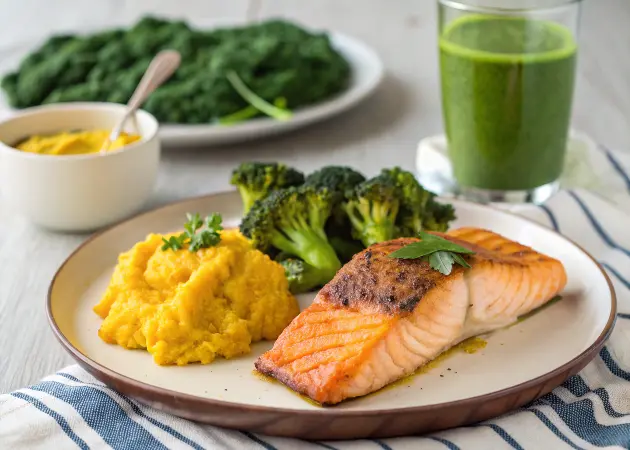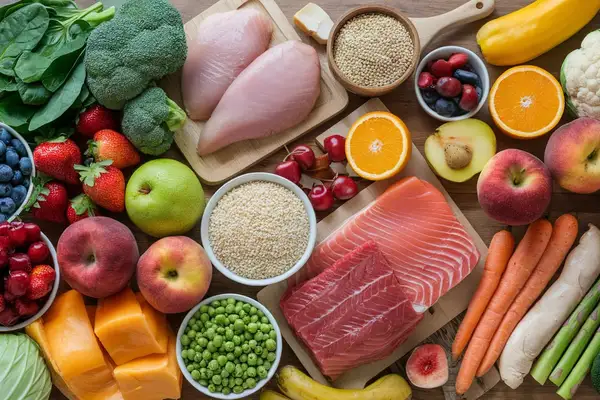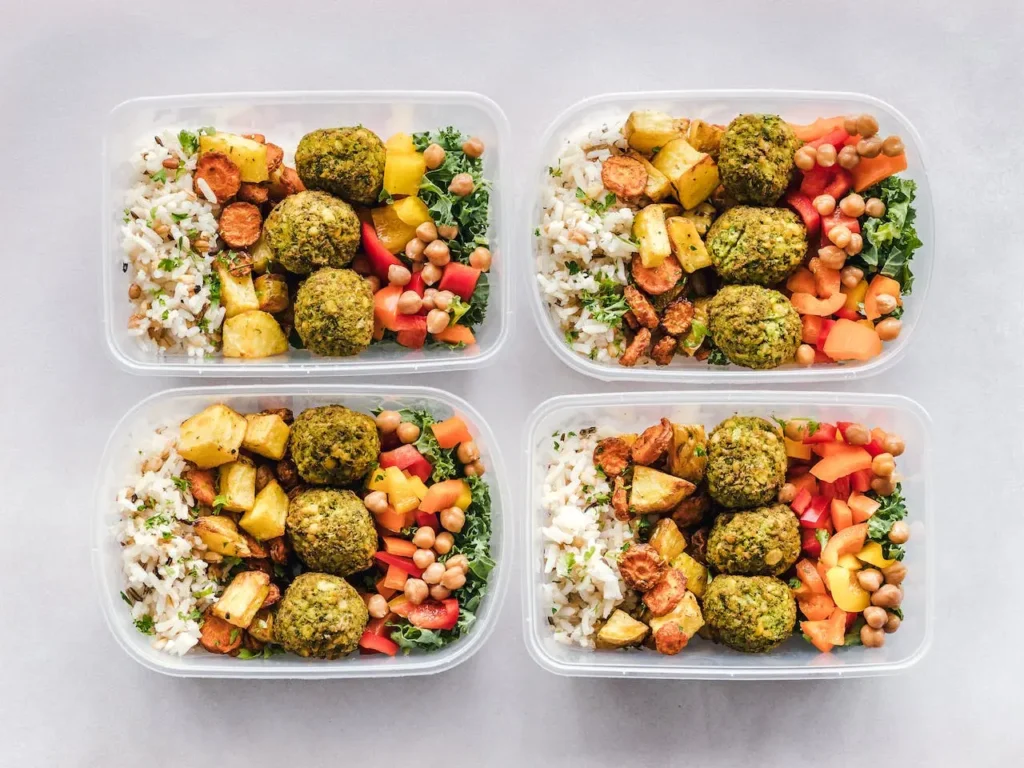Foods to Avoid with Pituitary Tumors | Pituitary Tumor Diet

This post may contain affiliate links, meaning I may earn a commission if you make a purchase, at no extra cost to you. I only recommend products I trust. Thank you for your support.
The pituitary gland, often referred to as the “master gland,” plays a crucial role in regulating various bodily functions.
When a pituitary tumor develops, it can disrupt the delicate balance of hormones produced by this gland, leading to a range of health complications.
A proper pituitary tumor diet plan is essential for individuals living with a pituitary tumor, as certain foods can either exacerbate or alleviate the condition’s symptoms.
In this guide, we will explore foods to avoid with pituitary tumors, healthy pituitary gland foods to eat, and the best vitamins for pituitary gland to help manage the condition.
Additionally, we will discuss how to shrink pituitary tumor naturally, and provide you with a 7-day pituitary tumor diet plan.
Please note that there is no conclusive evidence that any specific foods can shrink a pituitary tumor.
Consult with your healthcare provider or a registered nutritionist for personalized medical advice before making significant changes to your diet.
7-Day Pituitary Tumor Diet Plan
This 7-day pituitary tumor diet features foods recognized for their high antioxidant, anti-inflammatory, and potential anticancer compounds, such as green tea, cruciferous vegetables, turmeric, and sea vegetables.
Here is a detailed weekly pituitary gland tumor diet:

Day 1
Breakfast:
- Blueberry Green Tea Overnight Oats: Soak gluten-free oats in green tea and unsweetened almond milk overnight; in the morning, stir in blueberries, chia seeds, and a pinch of cinnamon. (½ cup oats, 1 cup green tea, ½ cup almond milk, ½ cup blueberries, 1 tbsp chia seeds, a dash of cinnamon)
Lunch:
- Cruciferous Power Salad with Steamed Broccoli & Kale: Toss lightly steamed broccoli, raw kale, and shredded Brussels sprouts with a lemon-tahini dressing and pumpkin seeds. (1 cup broccoli, 1 cup kale, ½ cup Brussels sprouts, 2 tbsp lemon-tahini dressing, 1 tbsp pumpkin seeds)
Dinner:
- Turmeric & Cauliflower Lentil Stew: Simmer red lentils with cauliflower, diced tomatoes, turmeric, garlic, ginger, and fresh herbs to create a warming anti-inflammatory stew. (½ cup red lentils, 1 cup cauliflower florets, 1 cup diced tomatoes, ½ tsp turmeric, 1 clove garlic, ½ inch ginger, herbs to taste)
Snacks:
- Walnut Medley with Green Tea: A small serving of raw walnuts paired with a chilled cup of green tea. (1 oz walnuts, 1 cup green tea)
- Sliced Cucumber with Hummus: Fresh cucumber rounds served with a side of classic hummus. (1 medium cucumber, ¼ cup hummus)

Day 2
Breakfast:
- Kale & Spinach Veggie Smoothie: Blend fresh kale, spinach, green apple, cucumber, and a squeeze of lemon with cold water for a nutrient-packed start. (1 cup kale, 1 cup spinach, 1 small green apple, ½ cucumber, juice of ½ lemon, 1 cup water)
Lunch:
- Tofu and Cruciferous Stir-Fry: Stir-fry cubes of organic tofu with a mix of bok choy, broccoli, and shredded cabbage in ginger-garlic sauce, served over a small portion of brown rice. (6 oz tofu, 1 cup bok choy, 1 cup broccoli, ½ cup shredded cabbage, 1 clove garlic, ½ inch ginger, ½ cup brown rice)
Dinner:
- Seaweed Miso Soup with Edamame & Quinoa: A light, nutrient-dense soup using miso paste, seaweed (wakame), tofu cubes, edamame, and served with quinoa on the side. (1 tbsp miso paste, 1 cup water, ½ cup seaweed, 3 oz tofu, ½ cup edamame, ½ cup quinoa)
Snacks:
- Mixed Berry Bowl: A mix of raspberries, blackberries, and strawberries known for their antioxidant properties. (1 cup mixed berries)
- Raw Almonds: A small handful of raw almonds to sustain energy. (1 oz almonds)

Day 3
Breakfast:
- Berry & Flaxseed Smoothie Bowl: Blend mixed berries, unsweetened coconut milk, and ground flaxseed; top with sliced kiwi and a few pumpkin seeds. (1 cup mixed berries, 1 cup coconut milk, 1 tbsp flaxseed, 1 kiwi, 1 tbsp pumpkin seeds)
Lunch:
- Quinoa Salad with Broccoli Rabe & Citrus: Combine quinoa with lightly sautéed broccoli rabe, orange segments, and fresh spinach tossed in an olive oil and lemon dressing. (1 cup quinoa, 1 cup broccoli rabe, 1 orange, 1 cup spinach, 1 tbsp olive oil, juice of ½ lemon)
Dinner:
- Herb-Marinated Tempeh with Roasted Brussels Sprouts: Marinate tempeh in apple cider vinegar and fresh herbs, then bake alongside Brussels sprouts lightly drizzled with extra virgin olive oil and garlic. (6 oz tempeh, 1 cup Brussels sprouts, 1 tbsp apple cider vinegar, 1 clove garlic, herbs to taste)
Snacks:
- Apple Slices with Almond Butter: Crisp apple slices paired with a smear of natural almond butter. (1 medium apple, 1 tbsp almond butter)
- Celery Sticks: Fresh celery sticks to crunch on their own or with a light dip. (3-4 celery sticks)

Day 4
Breakfast:
- Turmeric Ginger Smoothie: Blend together unsweetened almond milk, a frozen banana, a pinch of turmeric, a small piece of ginger, and a handful of spinach for an anti-inflammatory start. (1 cup almond milk, 1 frozen banana, ½ tsp turmeric, ½ inch ginger, 1 cup spinach)
Lunch:
- Roasted Beet and Arugula Salad: Combine roasted beets with fresh arugula, walnuts, and a drizzle of balsamic reduction to balance the earthy flavors. (2 medium beets, 2 cups arugula, 1 oz walnuts, 1 tbsp balsamic reduction)
Dinner:
- Lemon-Herb Baked Cod with Steamed Asparagus: Bake cod with lemon zest, fresh dill, and a dash of olive oil; serve with tender steamed asparagus. (6 oz cod, 1 cup asparagus, lemon zest, 1 tsp olive oil, dill to taste)
Snacks:
- Carrot Sticks with Tahini Dip: Crunchy carrot sticks served with a creamy tahini dip for a dose of healthy fats. (1 cup carrot sticks, 2 tbsp tahini)
- Green Tea: A calming warm or iced cup of green tea. (1 cup green tea)

Day 5
Breakfast:
- Buckwheat Pancakes with Mixed Berries: Prepare buckwheat pancakes using almond flour and top with a fresh compote of mixed berries and a sprinkle of hemp seeds. (2 small pancakes, ½ cup mixed berries, 1 tbsp hemp seeds)
Lunch:
- Miso-Turmeric Vegetable Soup: A hearty soup with miso paste, turmeric-infused broth, sea vegetables (such as wakame), mushrooms, and bok choy. (1 tbsp miso paste, 1 cup water, ½ tsp turmeric, ½ cup seaweed, ½ cup mushrooms, 1 cup bok choy)
Dinner:
- Curry Coconut Lentils with Cauliflower Rice: Simmer red lentils in coconut milk with curry spices and serve over rice made from grated cauliflower. (½ cup red lentils, 1 cup light coconut milk, ½ tsp curry powder, 1 cup cauliflower rice)
Snacks:
- Sliced Cucumber with Avocado Dip: Blend avocado with lime juice and a hint of garlic to create a smooth dip for crisp cucumber slices. (1 medium cucumber, ½ avocado, lime juice, a pinch of garlic powder)
- Fresh Pomegranate Seeds: A handful of pomegranate seeds for an extra dose of antioxidants. (½ cup pomegranate seeds)

Day 6
Breakfast:
- Chia Pudding with Pomegranate & Walnuts: Mix chia seeds with almond milk and let set; top with fresh pomegranate seeds and chopped walnuts. (3 tbsp chia seeds, 1 cup almond milk, ½ cup pomegranate seeds, 1 tbsp walnuts)
Lunch:
- Spinach & Avocado Salad with Citrus Dressing: Toss baby spinach, avocado slices, radishes, and a handful of arugula with a light citrus dressing infused with olive oil. (2 cups spinach, ½ avocado, 4 radish slices, 1 cup arugula, 1 tbsp olive oil, juice of ½ lime)
Dinner:
- Ginger-Garlic Tofu with Stir-Fried Broccoli & Snap Peas: Sauté cubes of extra-firm tofu with broccoli, snap peas, ginger, and garlic in a splash of tamari for added depth; serve with a side of wild rice. (6 oz tofu, 1 cup broccoli, 1 cup snap peas, 1 clove garlic, ½ inch ginger, ½ cup wild rice)
Snacks:
- Mixed Nuts & Seeds: A small mix of raw almonds, sunflower seeds, and pumpkin seeds to sustain energy. (1 oz mixed nuts and seeds)
- Herbal Green Tea: A soothing cup of herbal green tea. (1 cup herbal green tea)

Day 7
Breakfast:
- Avocado Toast with Sprouts: Toast a slice of gluten-free whole-grain bread, spread with mashed avocado, and top with alfalfa sprouts and a drizzle of extra virgin olive oil. (1 slice bread, ½ avocado, a handful of sprouts, 1 tsp olive oil)
Lunch:
- Roasted Eggplant & Bell Pepper Quinoa Salad: Roast eggplant cubes and red bell pepper slices, then toss with quinoa, fresh basil, and a squeeze of lemon. (1 cup quinoa, 1 small eggplant, 1 red bell pepper, a handful of basil, juice of ½ lemon)
Dinner:
- Salmon with Turmeric Mashed Cauliflower & Steamed Broccoli: Bake a salmon fillet seasoned with lemon and herbs; serve alongside turmeric-infused mashed cauliflower and steamed broccoli for a nutrient-dense dinner. (6 oz salmon, 1 cup cauliflower, 1 cup broccoli, ½ tsp turmeric, lemon zest)
Snacks:
- Fresh Orange Slices with Almonds: Vibrant orange slices paired with a few raw almonds. (1 medium orange, 1 oz almonds)
- Green Tea: End your day with a calming cup of green tea. (1 cup green tea)
Foods Good for a Pituitary Tumors
Below are the foods that are considered beneficial for overall hormonal balance and reduced inflammation, factors that may help support a healthy environment when managing a pituitary tumor.
1. Antioxidant-rich Fruits
These fruits are loaded with vitamins and polyphenols that combat oxidative stress.
- Blueberries: Packed with antioxidants and vitamins for cellular repair.
- Raspberries: High in fiber and beneficial phytochemicals.
- Strawberries: Rich in vitamin C and various flavonoids.
- Blackberries: Provide a robust mix of antioxidants and vitamins.
2. Cruciferous Vegetables
Rich in compounds that support detoxification and may aid hormone balance.
- Broccoli: Contains sulforaphane, known for supporting detox pathways.
- Kale: Highly nutritious and offers a wealth of vitamins and antioxidants.
- Brussels Sprouts: Excellent source of vitamins, fiber, and anti-inflammatory compounds.
- Cabbage: Beneficial for gut health and hormone regulation.
- Bok Choy: Provides key minerals and supports overall cellular health.
3. Colorful Vegetables
Provide vitamins, minerals, and antioxidants essential for cell health.
- Spinach: High in iron, vitamins, and antioxidants.
- Carrots: A great source of beta-carotene and vitamin A.
- Sweet Potatoes: Rich in fiber, vitamins A and C, and antioxidants.
- Beets: Contain nitrates and antioxidants that support blood flow.
- Tomatoes: Full of vitamin C and lycopene, an antioxidant linked to many health benefits.
- Collard Greens: Provide calcium, fiber, and several essential vitamins.
- Swiss Chard: Offers magnesium, potassium, and vitamins A, C, and K.
4. Citrus Fruits
These fruits are rich in vitamin C, flavonoids, and other antioxidants that can support overall cellular health and immune function.
- Oranges: A classic source of vitamin C and other immune-supporting nutrients.
- Grapefruits: High in vitamin C and antioxidants that support detoxification pathways.
- Lemons: Often used to add flavor and boost vitamin C content in beverages and dishes.
- Limes: Similar to lemons, they provide vitamin C and add a refreshing flavor to meals.
5. Omega-3 Fatty Acids
These fats have potent anti-inflammatory properties and support cellular health.
- Fatty fish: Wild-caught salmon, sardines, mackerel
- Seeds: Flaxseeds and chia seeds
- Nuts: Walnuts, almonds, pistachios
6. Monusaturated Fats
These fats help with hormone production and offer anti-inflammatory benefits.
- Extra Virgin Olive Oil
- Avocado
7. Plant-Based Proteins
These provide high-quality protein without the extra saturated fats found in some animal proteins.
- Tofu
- Tempeh
- Other Soy-Based Products
8. Lean Animal Proteins
These proteins help maintain muscle mass and support overall energy without overloading on fat.
- Skinless chicken or turkey
- Lean cuts of fish
9. Herbs and Spices
Known for their anti-inflammatory and antioxidant properties, these can be incorporated into various meals.
- Turmeric
- Ginger
- Garlic
- Cinnamon
10. Beverages
Proper hydration is essential for cellular health, efficient nutrient transport, and overall wellness. These beverages offer additional benefits from antioxidants to electrolytes.
- Water: The most essential beverage for hydration. Aim for at least 8-10 cups a day depending on activity level and individual needs.
- Herbal teas: chamomile tea, peppermint tea, ginger tea are caffeine-free options with natural anti-inflammatory and antioxidant properties.
- Green tea: Rich in catechins and antioxidants, supporting cellular health and reducing inflammation.
- Infused water: Water infused with fruits, vegetables, or herbs such as cucumber and mint water, lemon and lime water.
- Coconut water: A natural source of electrolytes that can support hydration, especially after physical activity.
11. Whole Grains
Whole grains are nutrient-rich sources of complex carbohydrates that provide essential fiber, B vitamins, and minerals to support sustained energy and overall health.
- Quinoa
- Brown rice
- Whole grain bread
- Oats
- Barley
12. Low-Fat Dairy or Non-Dairy Alternatives
Great for those sensitive to lactose or preferring plant-based diets; these can be used in recipes or as a beverage.
- Low-fat yogurt
- Skim milk
- Coconut milk
- Oat milk
- Fortified almond milk
- Fortified soy milk
- Fortified coconut milk
13. Probiotics
These support gut health, which is closely linked to immune function.
- Yogurt
- Kefir
- Sauerkraut
Foods to Avoid With Pituitary Tumor
Individuals with a pituitary tumor should be mindful of the foods that may negatively impact their health.
Here are 7 foods to avoid with pituitary tumor:
1. High Sodium Foods
High sodium foods can contribute to fluid retention and exacerbate the effects of a pituitary tumor.
Here are some of the high sodium foods to avoid with pituitary tumor:
- Processed meats (e.g., bacon, sausage, deli meats)
- Canned soups and broths
- Fast food
- Frozen meals
- Salted snacks (e.g., chips, pretzels)
2. High Glycemic Index Foods
Refined carbohydrates can lead to blood sugar spikes and may worsen hormonal imbalances.
Here are some of the high glycemic index foods to avoid with pituitary tumor:
- White bread
- White rice
- Sugary cereals
- Pastries and baked goods
- Sugary beverages
3. Alcohol
Alcohol can interfere with the body’s ability to regulate hormone levels and may also contribute to weight gain, a common concern for those with pituitary tumors.
- Beer
- Wine
- Spirits
- Cocktails
- Liqueurs
4. Caffeine
Excessive consumption of caffeine, found in coffee, tea, and energy drinks, can disrupt sleep patterns and exacerbate the symptoms of a pituitary tumor.
- Coffee
- Energy drinks
- Chocolate
5. High Fat and Fried Foods
These foods are often high in unhealthy fats, preservatives, and additives, which can burden the body and worsen the effects of a pituitary tumor.
Here are some of the high fat and fried foods to avoid with pituitary tumor:
- Deep-fried foods (e.g., french fries, fried chicken)
- High-fat dairy products (e.g., whole milk, full-fat cheese)
- Fatty cuts of meat
- Butter and margarine
- Cream-based sauces and dressings
6. Foods with Added Hormones or Antibiotics
Foods with added hormones or antibiotics may disrupt the endocrine system, potentially impacting the delicate hormonal balance that individuals with pituitary tumors need to manage.
- Non-organic meats and dairy products with added hormones
- Conventionally farmed fish with added antibiotics
- Processed foods with undisclosed hormone additives
7. High-phenylalanine Foods
Phenylalanine is an amino acid found in some foods and is also used in the production of the artificial sweetener aspartame.
Individuals with certain types of pituitary tumors may have altered phenylalanine metabolism, and consuming foods high in phenylalanine or artificial sweeteners containing it may not be well-tolerated.
Here are some of the high phenylalanine foods to avoid with pituitary tumor:
- Aspartame (artificial sweetener)
- Phenylalanine-rich foods (e.g., certain protein supplements)
Best Vitamins for Pituitary Gland
In addition to a balanced diet, certain vitamins and minerals can provide targeted support for the pituitary gland.
Here are the best vitamins for pituitary gland:
- Vitamin D: Supports overall endocrine system function and may help regulate pituitary hormone secretion.
- Vitamin B6: Plays a role in hormone production and regulation, which can be beneficial for the pituitary gland.
- Vitamin C: Acts as an antioxidant and supports immune function, potentially aiding in the overall health of the pituitary gland.
- Vitamin E: Another antioxidant that may help protect cells, including those in the pituitary gland, from oxidative damage.
- Vitamin A: Essential for overall glandular health, including the pituitary gland.
- Vitamin K: Important for bone health, which is relevant as the pituitary gland is located near the base of the brain.
How to Shrink Pituitary Tumor Naturally
While pituitary tumors can be challenging to manage, there are several natural approaches that may help shrink the tumor size and alleviate the associated symptoms.
Here are some tips on how to shrink pituitary tumor naturally:
- Stress Management: Practicing stress-reducing techniques, such as meditation, yoga, or deep breathing exercises, can help regulate the body’s hormonal responses.
- Exercise: Regular physical activity can improve overall health, reduce inflammation, and potentially contribute to the reduction of pituitary tumor size.
- Herbal Supplements: Certain herbs, such as ashwagandha and Rhodiola, have been studied for their potential to support pituitary gland function and reduce tumor growth.
- Dietary Changes: Adopting a 7 day meal plan for pituitary tumor can provide targeted support for the pituitary gland.
- Lifestyle Modifications: Getting adequate sleep, maintaining a healthy weight, and avoiding exposure to toxins or endocrine disruptors can all contribute to the overall health of the pituitary gland.
- Avoid Toxins: Minimizing exposure to endocrine-disrupting chemicals, such as those found in personal care products, cleaning supplies, and certain plastics, can help reduce the burden on the pituitary gland.
- Hydration: Drinking plenty of water throughout the day can help maintain proper fluid balance and support the body’s natural detoxification processes.
Resources
- The Effect of Diet in Pituitary Tumor Management
- The Influence of Diet on Pituitary Tumors
- Pituitary Network Association
Conclusion
Navigating the complexities of a pituitary tumor can be a daunting task, but with the right pituitary diet plan and lifestyle strategies, individuals can take control of their health and improve their overall well-being.
By understanding the foods to avoid with pituitary tumor, pituitary gland foods to eat, and best vitamins for pituitary gland, patients can work towards optimal pituitary gland function and a better quality of life.
Remember, every individual’s journey with a pituitary tumor is unique, and it’s essential to collaborate closely with a healthcare team to develop a personalized pituitary tumor die that addresses specific needs and concerns.
With dedication and persistence to the pituitary tumor gland diet, individuals can find the path to managing their pituitary tumor and embracing a healthier, more fulfilling life.
- 17 foods to avoid while breastfeeding
- Foods to eat after tooth extraction
- Foods to avoid while taking Saxenda
- How to cure GERD cough instantly
- 7-day meal plan for cancer patients
- 6 week Ozempic weight loss plan
- Cancer care tips and resources
- What is follicular lymphoma?
- 7 foods to avoid with UTI
- 7-day GERD diet plan
- Avoid these foods while on Contrave
- How much is Ozempic without insurance?
- 7-day low sodium meal plan
- Thyroid cancer symptoms
- Foods to avoid if alkaline phosphatase is high
- 5 foods to avoid with trulicity
- 3000 calorie meal plan for muscle gain
- 7-day high protein meal plan for weight loss
FAQs
Can stress affect a pituitary tumor?
Yes, chronic stress can disrupt the body’s hormonal balance and increase inflammation, which can exacerbate pituitary tumor symptoms.
How long does it take to recover from pituitary tumor surgery?
The full recovery process from pituitary tumor surgery, including the return to normal activities and the stabilization of hormone levels, can take up to 6 months to fully recover.
What are the main symptoms of a pituitary tumor?
The main symptoms of a pituitary tumor can include headaches, vision problems, hormonal imbalances, fatigue, and changes in mood or sexual function.
The specific symptoms depend on the size and location of the tumor, as well as the hormones it affects.
Are there any specific fruits to avoid with a pituitary tumor?
Generally, fruits are healthy, but it’s wise to limit high-sugar fruits like grapes, bananas, and dried fruits especially if they affect blood sugar levels.
Disclaimer: The information provided in this article is for educational purposes only and is not intended to replace professional medical advice, diagnosis, or treatment.




